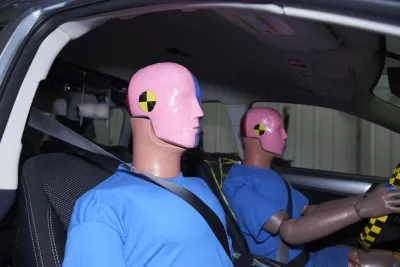Revising federal crash test standards and updating test dummies to mimic a wider variety of bodies could save thousands of lives each year.

A coalition titled Vehicle Equity Rules in Transportation (Verity Now) is calling on federal regulators to make crash testing more inclusive through the use of "biofidelic" crash test dummies. According to reporting by Kea Wilson, the coalition claims that adopting updated test dummy standards and reviewing them regularly could save up to 1,342 lives each year.
Because test dummies reflect the male body, "[s[tudies show that when they’re inside of a car at the time of a crash, women and people who were assigned female at birth are 17 percent more likely to die and 73 percent more likely to be seriously injured than a driver or passenger who was assigned male at birth who’s struck in the same conditions."
Under the recently passed Infrastructure Investment and Jobs Act, the regulators who supervise the New Car Assessment Program will, for the first time, be required to test and provide information to prospective car-buyers on how likely their vehicle is to kill or injure a pedestrian, a critical standard that other nations adopted way back in 2008.
However, the new requirements won't ban cars that fail from being sold, writes Wilson. While other factors such as driving behavior and vehicle choice are also at play, "few doubt that sexist vehicle testing standards are a major contributor to the problem, or that crash testing standards desperately need to be fixed."
Susan Molinari, a former member of Congress from New York and Verity Now co-chair, says women's physiology differs in ways that make a big impact on how crashes affect their bodies, and crash testing should "compensate for those differences." If the NHTSA does not act on updating the standards, her group is prepared to lobby for legislation that would mandate improved vehicle safety standards.
FULL STORY: Advocates Urge Federal Update of Gender-Biased Crash Test Standards

Maui's Vacation Rental Debate Turns Ugly
Verbal attacks, misinformation campaigns and fistfights plague a high-stakes debate to convert thousands of vacation rentals into long-term housing.

Planetizen Federal Action Tracker
A weekly monitor of how Trump’s orders and actions are impacting planners and planning in America.

In Urban Planning, AI Prompting Could be the New Design Thinking
Creativity has long been key to great urban design. What if we see AI as our new creative partner?

How Trump's HUD Budget Proposal Would Harm Homelessness Response
Experts say the change to the HUD budget would make it more difficult to identify people who are homeless and connect them with services, and to prevent homelessness.

The Vast Potential of the Right-of-Way
One writer argues that the space between two building faces is the most important element of the built environment.

Florida Seniors Face Rising Homelessness Risk
High housing costs are pushing more seniors, many of them on a fixed income, into homelessness.
Urban Design for Planners 1: Software Tools
This six-course series explores essential urban design concepts using open source software and equips planners with the tools they need to participate fully in the urban design process.
Planning for Universal Design
Learn the tools for implementing Universal Design in planning regulations.
Gallatin County Department of Planning & Community Development
Heyer Gruel & Associates PA
JM Goldson LLC
City of Camden Redevelopment Agency
City of Astoria
Transportation Research & Education Center (TREC) at Portland State University
Jefferson Parish Government
Camden Redevelopment Agency
City of Claremont





























